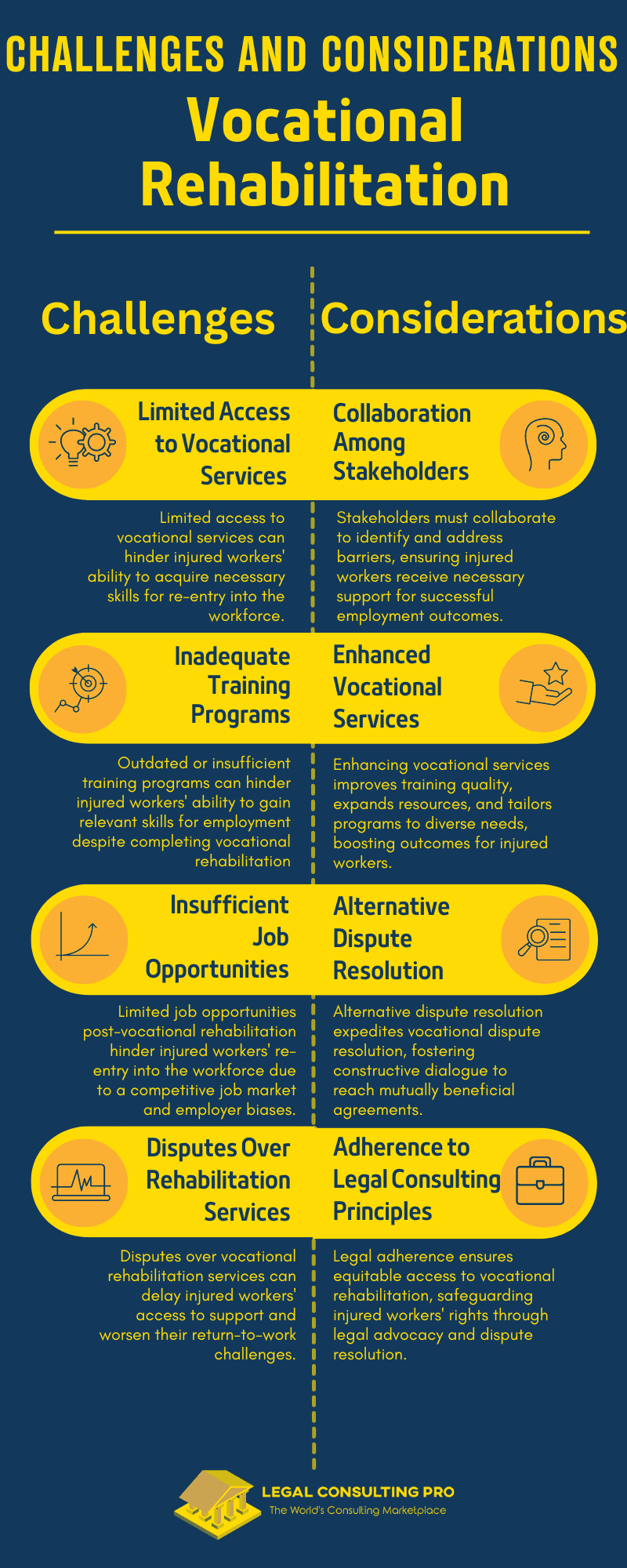Workers’ compensation is a vital safety net designed to protect employees who sustain work-related injuries or illnesses. Among the myriad components of workers’ compensation, vocational rehabilitation plays a crucial role in facilitating injured workers’ return to gainful employment. From a legal consulting perspective, understanding the nuances of vocational rehabilitation within the workers’ compensation framework is essential for both employers and employees. This article explores the multifaceted role of vocational rehabilitation in workers’ compensation, offering valuable legal consulting insights into its significance, processes, and implications.
Understanding Vocational Rehabilitation
Vocational rehabilitation stands as a multifaceted initiative designed to support individuals who have sustained workplace injuries or illnesses in their journey back to gainful employment. It represents a holistic approach that combines a range of services and interventions meticulously tailored to meet the individual needs and capabilities of injured workers. At its core, vocational rehabilitation strives to facilitate a seamless reintegration of these individuals into the workforce, thereby empowering them to regain their independence and livelihoods.
The comprehensive nature of vocational rehabilitation encompasses a diverse array of services aimed at addressing the multifaceted challenges faced by injured workers. One integral component of this process is vocational assessment, wherein professionals evaluate the individual’s skills, abilities, interests, and limitations to determine the most suitable path forward. This assessment serves as the foundation upon which subsequent interventions and support mechanisms are tailored.
Another vital aspect of vocational rehabilitation is skills training, which equips injured workers with the necessary knowledge and competencies to succeed in their chosen field or occupation. Whether through formal education programs, on-the-job training, or specialized skill-building workshops, this training empowers individuals to enhance their employability and pursue meaningful employment opportunities.
Furthermore, vocational rehabilitation extends support in the form of job placement assistance, wherein professionals work collaboratively with employers to identify suitable job opportunities that align with the individual’s capabilities and vocational goals. This may involve job matching, resume writing assistance, interview coaching, and networking opportunities, all aimed at facilitating a smooth transition back into the workforce.
Legal Consulting Framework
In the realm of workers’ compensation, vocational rehabilitation is subject to a framework of laws and regulations that vary from one jurisdiction to another. These legal consulting provisions establish the parameters governing the provision of vocational rehabilitation services and delineate the rights and responsibilities of key stakeholders, including employers, insurers, and injured workers. By outlining specific requirements and standards, these laws aim to ensure that injured workers receive the support they need to reintegrate into the workforce following a workplace injury or illness.
One of the central aspects of workers’ compensation laws related to vocational rehabilitation is the requirement for employers to provide such services to eligible workers. These laws may mandate that employers offer vocational rehabilitation benefits as part of their workers’ compensation coverage, ensuring that injured workers have access to essential services aimed at facilitating their return to suitable employment.
Furthermore, workers’ compensation statutes typically specify the scope of vocational rehabilitation benefits available to injured workers. This may include coverage for vocational assessment, skills training programs, job placement assistance, and other supportive services designed to enhance employability and promote successful reintegration into the workforce.
Moreover, eligibility criteria for vocational rehabilitation benefits are often delineated in workers’ compensation laws, providing guidelines for determining which injured workers qualify for such services. Factors such as the severity of the injury, the impact on the individual’s ability to work, and the prognosis for recovery may be considered in assessing eligibility for vocational rehabilitation.
Additionally, workers’ compensation statutes may establish the duration of vocational rehabilitation benefits, setting limits on the length of time during which injured workers are entitled to receive such services. These provisions ensure that vocational rehabilitation remains accessible and timely, allowing injured workers to receive the support they need within a reasonable timeframe.
Overall, the legal consulting framework governing vocational rehabilitation in workers’ compensation cases plays a crucial role in safeguarding the rights of injured workers and facilitating their return to gainful employment. By establishing clear guidelines and standards, these laws promote consistency, fairness, and accountability in the provision of vocational rehabilitation services, ultimately benefiting both injured workers and the broader workforce.
Role of Legal Consulting Professionals
Legal consulting professionals are instrumental in navigating the intricate landscape of vocational rehabilitation within the workers’ compensation system. Advocating for their clients’ rights, ensuring compliance with laws and regulations, and providing expert guidance are among the key roles these professionals fulfill.
Advocacy for Injured Workers:
- Attorneys representing injured workers play a crucial role in advocating for their client’s rights to receive appropriate vocational rehabilitation services.
- They work diligently to ensure that injured workers have access to vocational assessment, training programs, job placement assistance, and other necessary services to facilitate their return to suitable employment.
Compliance and Legal consulting Obligations:
- Legal consulting professionals representing injured workers ensure that employers and insurers comply with legal consulting obligations regarding vocational rehabilitation.
- They closely monitor the implementation of vocational rehabilitation benefits and intervene when there are discrepancies or violations of workers’ rights.
Protection of Clients’ Interests:
- Defense attorneys representing employers and insurers work to protect their client’s interests while ensuring compliance with legal consulting requirements related to vocational rehabilitation.
- They strive to minimize financial liabilities while upholding their obligations to provide injured workers with the necessary support and assistance for vocational reintegration.
Expert Guidance:
- Legal consultants specializing in vocational rehabilitation issues offer expert guidance to clients navigating the complexities of the workers’ compensation system.
- They provide comprehensive assessments, offer strategic advice, and assist clients in making informed decisions regarding vocational rehabilitation options and dispute-resolution strategies.
Resolution of Disputes:
- Legal consulting professionals play a pivotal role in resolving disputes related to vocational rehabilitation through negotiation, mediation, or litigation.
- They work to achieve fair and equitable outcomes for their clients, ensuring that injured workers receive the vocational rehabilitation services to which they are entitled under the law.
Education and Training:
- Legal professionals also engage in educational efforts to raise awareness about vocational rehabilitation rights and responsibilities among workers, employers, insurers, and other stakeholders.
- By providing training sessions, workshops, and informational resources, they empower individuals to navigate the workers’ compensation system more effectively and advocate for their rights.
In summary, legal consulting professionals serve as advocates, advisors, and champions of justice in the realm of vocational rehabilitation within the workers’ compensation system. Their expertise, dedication, and commitment to upholding workers’ rights contribute significantly to ensuring that injured workers receive the support they need to regain their livelihoods and rebuild their lives after a workplace injury or illness.
Challenges and Considerations
Despite the invaluable role vocational rehabilitation plays in facilitating the return of injured workers to the workforce, it is not without its challenges within the framework of workers’ compensation. These challenges, ranging from limited access to vocational services to disputes over the necessity of rehabilitation, can impede the successful reintegration of injured workers into gainful employment. However, proactive strategies and collaborative efforts among stakeholders offer promising avenues to address these challenges and enhance the effectiveness of vocational rehabilitation programs. By acknowledging these hurdles and implementing targeted solutions, stakeholders can ensure that injured workers receive the support they need to overcome barriers and achieve meaningful employment outcomes.
Challenges:
Limited Access to Vocational Services:
- Injured workers may face hurdles in accessing vocational services due to factors such as geographical limitations, resource constraints, or insufficient funding.
- Limited access to vocational services can hinder injured workers’ ability to acquire the necessary skills and training for re-entry into the workforce.
Inadequate Training Programs:
- Inadequacies in training programs, including outdated curriculum or insufficient duration, may pose challenges for injured workers seeking to acquire relevant skills for employment.
- These inadequacies can impede injured workers’ ability to secure meaningful employment opportunities despite completing vocational rehabilitation programs.
Insufficient Job Opportunities:
- Despite completing vocational rehabilitation programs, injured workers may struggle to find suitable job opportunities due to a competitive job market, employer biases, or limited openings in their area.
- Insufficient job opportunities can undermine the effectiveness of vocational rehabilitation efforts and hinder injured workers’ ability to re-enter the workforce successfully.
Disputes Over Rehabilitation Services:
- Disputes may arise between injured workers, employers, and insurers regarding the necessity, adequacy, or scope of vocational rehabilitation services.
- These disputes can lead to prolonged legal proceedings, delaying injured workers’ access to essential services and exacerbating their challenges in returning to work.
Strategies to Address Challenges:
Collaboration Among Stakeholders:
- Stakeholders, including injured workers, employers, insurers, vocational rehabilitation providers, and regulatory agencies, should collaborate to identify barriers and develop solutions to enhance access to vocational services.
- By working together, stakeholders can ensure that injured workers receive the support they need to overcome challenges and achieve successful employment outcomes.
Enhanced Vocational Services:
- Efforts should be made to enhance vocational services by improving the quality of training programs, expanding access to resources, and tailoring services to meet the diverse needs of injured workers.
- Investing in innovative training initiatives, providing career counseling, and offering incentives for employers to hire injured workers can help improve vocational outcomes.
Alternative Dispute Resolution:
- Employing alternative dispute resolution mechanisms, such as mediation or arbitration, can help expedite the resolution of disputes over vocational rehabilitation services.
- By facilitating constructive dialogue and negotiation, alternative dispute resolution can help parties reach mutually acceptable agreements and avoid prolonged legal consulting battles.
Adherence to Legal Consulting Principles:
- Adherence to legal principles governing workers’ compensation and vocational rehabilitation is essential to ensure that injured workers’ rights are protected.
- Legal consulting professionals play a critical role in advocating for injured workers’ rights, resolving disputes, and ensuring compliance with legal obligations, thereby promoting fair and equitable access to vocational rehabilitation services.

Conclusion
In conclusion, vocational rehabilitation plays a vital role in the workers’ compensation landscape, offering injured workers the support they need to regain their economic independence and return to work following a workplace injury or illness. From a legal consulting perspective, understanding the intricacies of vocational rehabilitation is essential for all stakeholders involved in the workers’ compensation process. By leveraging vocational rehabilitation services effectively, employers, insurers, and injured workers can navigate the complexities of workers’ compensation claims and ensure positive outcomes for all parties involved.
Similar blogs:
Legal Consulting: Mental Health and Workers’ Compensation: Addressing PTSD and Stress Claims
Navigating Permanent Disability: Legal Consulting Guide For Workers’ Compensation Lawyers







































